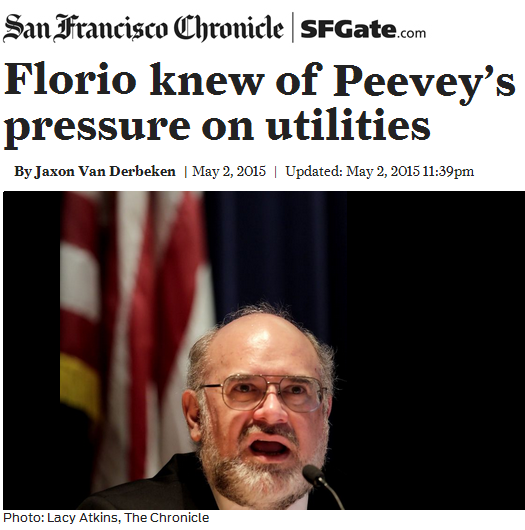Florio, Peevey, And Litzinger Met Secretly Minutes Before CPUC Hearing
BRIEF EXPLAINER on why this story is vital to understanding corruption at the State’s most important regulatory court. Learn More.

A California Public Utilities Commission member who was present when the agency’s president pressured Southern California utilities to funnel $25 million to a pet cause last year, according to the account of a top utility executive.
Commissioner Mike Florio – who drew criticism last year for his willingness to intervene on behalf of Pacific Gas and Electric Co. in a rate-setting case – twice sat in on meetings in 2014 in which then-commission President Michael Peevey lobbied Southern California Edison executives over the shutdown of the troubled San Onofre nuclear power plant, the executive said. Edison co-owns the plant with San Diego Gas and Electric Co. Edison Energy President Ron Litzinger said in a sworn affidavit released last week that that Peevey had cajoled the utilities during both meetings to give $25 million toward greenhouse gas research at UCLA. Neither session was made public until now, although commission rules state that high-level contacts between utilities and the regulators who oversee them typically must be disclosed.
Just after Litzinger met with Peevey and Florio on May 14, 2014, at the agency’s San Francisco headquarters, he answered questions during a commission hearing about the San Onofre settlement. He said he had never secretly communicated directly with commissioners, but that the company often communicated one-on-one and had been making proper notifications. Florio, who was at the meeting, said nothing, hearing transcripts show.
Second meeting
It wasn’t the first such back-channel meeting between Edison executives and Peevey and Florio, Litzinger said: They also conferred May 2, when Peevey first urged the utilities to honor an earlier commitment he said they had made and contribute toward greenhouse gas research.
In a subsequent phone call, Florio told Litzinger not to disclose that the two sides had met, saying he was passing along instructions from Peevey’s chief of staff, Litzinger said.
Florio, who did not return calls seeking comment, spent 30 years as an attorney with the consumer advocate group The Utility Reform Network before Gov. Jerry Brown named him to the commission in 2011. E-mails released last year revealed that he had offered to help PG&E get its preferred judge for a rate-setting case, and some critics said the latest accusations indicate he’s strayed far from his roots.
“He apparently didn’t even express concerns about what was happening – that is the saddest thing of all,” said Ed Howard, a University of San Diego expert on regulatory enforcement.
Florio oversaw the settlement negotiations over the San Onofre plant shutdown that resulted in a $4.8 billion deal, much of it paid by customers of Edison and San Diego Gas & Electric.
The agreement that the utilities struck in spring 2014 over the closure bore strong similarities to a tentative pact that Peevey reached in a secret meeting with Edison executive Stephen Pickett in 2013 at a hotel in Warsaw – except there was no mention of the millions that Peevey wanted for greenhouse gas research.
Edison disclosed details of the Polish meeting this year after state agents investigating possible corruption at the state commission found notes of the outlined Warsaw deal in a search of Peevey’s home.
Session notes?
At the meeting May 2, 2014, Litzinger said in his affidavit, Florio was present when Peevey waved what appeared to be notes of the Polish session as proof that Edison had promised to fund the research.
Peevey complained that the greenhouse-gas research money was “missing” and pushed for the San Onofre owners to give $25 million to UCLA, Litzinger said.
Five days later, Litzinger said, he called Florio to ask whether the meeting should be made public. Florio initially said he had no problem with Edison doing so, but after checking with Peevey’s chief of staff, called back to say the utility should not report the contact because its executives had been in “listening mode,” Litzinger said.
The commission has rules governing disclosure of contacts outside of public meetings – talks known as ex parte communications. During Peevey’s 12-year tenure as commission president, which ended in December, agency officials interpreted the rules as allowing such talks to remain secret if the discussions were “one-sided” – that is, if commissioners were doing all the talking.
When Peevey, Florio and Edison executives met for a second time in May, the commission president again raised the subject of greenhouse-gas research funding, Litzinger said. “I stated I could not engage in a substantive conversation on that topic,” Litzinger said in his affidavit.
That afternoon at the commission’s hearing on the San Onofre closure, San Diego attorney Mike Aguirre, who was representing utility customers challenging the deal, asked Litzinger if he had held any undisclosed ex parte talks with commission officials over the shutdown settlement. Litzinger said no.
More pressure
Peevey continued to pursue the research money throughout May, Edison executives said. In late May, one utility official said in an internal e-mail that Peevey “views (Edison) as just taking and not giving to a matter that is very important to him, Florio and others.”
In September, it was Florio who proposed dedicating $25 million to greenhouse gas research and having the utilities work with the University of California Energy Institute at Berkeley on how the money should be spent. Some of the money eventually went to a UCLA public policy school where Peevey had been named to an advisory board.
In November, the commission approved the entire shutdown deal.
Mark Toney, executive director of The Utility Reform Network where Florio worked for three decades, blames lax commission rules for the failure to disclose the meetings, not Florio.
Toney said Florio has “made some mistakes” in dealing with utilities. “But we want to stop the closed-door meetings” rather than blame any one commissioner, he said.
Howard, the regulatory law expert, was not as charitable.
“Commissioner Florio owes an explanation to the rate-paying public and the citizens of the state as to why he didn’t blow the whistle,” Howard said.
“These are not matters for legal debate,” he said. “This is a question: Do you blow the whistle if you see something is a problem, or do you swallow the whistle?”
Jaxon Van Derbeken is a San Francisco Chronicle staff writer. E-mail:jvanderbeken @ sfchronicle.com Twitter: @jvanderbeken

